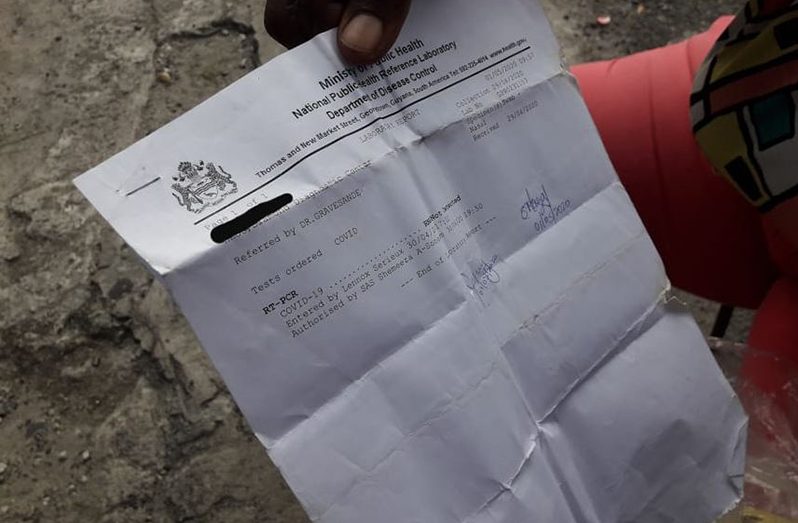— says virus is a ‘serious thing’ she would not want to experience again
JOY (not her real name) is a 65-year-old woman. She sells cold drinks from a cooler on the pavement of the busy shopping centre of Regent Street. Sometimes, atop her cooler, she has mints, regular sweets and cigarettes, also for sale. If you stop to purchase a cold ‘Coke’ from her, you can tell that she greets you with a warm smile on her face from the way her mask rises, just barely, from its position of rest over the lower half of her face.
She hurries to sanitise the money she collects, as well as her hands, as she is very cautious about her contact with her customers. Her reasoning is simple, really. Back in April, on her birthday, she was taken to the West Demerara Regional Hospital because she had contracted the novel coronavirus (COVID-19). Joy also has a heart condition, which, combined with her age, makes her more vulnerable to this virus.
“The coronavirus is a serious thing, I telling yuh,” Joy told this newspaper. “It really stress me out.”
On Saturday, April 4, the woman realised that the symptoms she was experiencing for a few days had not subsided. In fact, she said they felt like they were worsening. She felt tired, weak, and had lost her appetite. By this time, the COVID-19 pandemic had spread to Guyana just less than a month before. She was acutely aware of the virus.
“Is right out here (on Regent Street) I get the virus,” Joy recounted, as she nervously looked around at the shoppers going in and out of nearby stores. “Every day I does be out here; I don’t go nowhere, so is right here I had to get it from,” she said.
And so she called the COVID-19 hotline. Before long, it was confirmed that she had indeed contracted the virus, and was taken to the hospital for institutional care. There, the doctors did health checkups on Joy and the seven other COVID-19 patients twice daily; once in the morning and once in the evening. She was fed good food. “Greens and so,” she recalled fondly.
While the hospital staff were very friendly, she was not in the comfort of her own home and rarely felt at ease.
COULDN’T SLEEP
At nights, however, she could not sleep, because she is accustomed to sleeping with her lights on; since a youngster, she’d always been afraid of the dark. And so, while in hospital, she played games all night on her ‘Tablet’, because she had no one to keep her company. It was only during the day that she would be able to get a few hours of sleep.
Initially, she said, she was put on the ventilator, as the coronavirus was affecting her severely, causing her lungs to fail. While her body fought off the infection, this machine helped her to breathe. It wasn’t the most comfortable thing, either, but it was necessary.
A few weeks later, she was taken to the Diamond Diagnostic Hospital where she received the last of her institutional care for COVID-19, before she was allowed to go back home. Her daughter and granddaughter had also contracted the virus from her, and they, too, were taken to this hospital after she began receiving care.
She was not told when her final day would be, but on the day the doctors informed her that she could go back home, which was Tuesday, May 7, the first thing she rushed to do was pack her bags. Soon after, she got into a taxi (she wasn’t going to risk travelling in a minibus) and went straight home to her home in Sophia.
Though Joy has since returned to her humble “cooler business” on Regent Street, she is now extra cautious. On numerous occasions she has tried to encourage other persons in her vicinity to take the necessary precautions, such as wearing a mask, to protect themselves from COVID-19. To a large extent, however, her attempts are met with taunts. She said that she has even been “cussed out” by male porters working at the nearby stores.
SALES AFFECTED
Joy’s sales have also been affected, as persons there are hesitant to purchase from her; her only sales come from those persons who pass in vehicles on Regent Street, or from persons who don’t usually frequent the area. It is baffling to the elderly woman that persons stigmatise her for once having COVID-19, and would not purchase from her, but yet, many of those same persons refuse to take the necessary precautions to protect themselves from the virus otherwise.
“How I look at it is that plenty people gonna have to get the (coronavirus) for them to take it seriously,” Joy said, adding: “They gonna wait until things get bad before they believe that this thing is a serious thing.”
She sighed, defeatedly, and wiped the top of her cooler with a cloth soaked in diluted bleach. COVID-19 was a harrowing experience for her, and she really does not want to experience that again.



.jpg)










